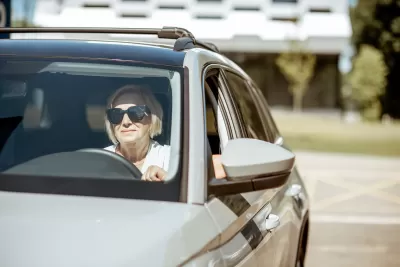Limited transit options and a lack of walkability mean more older Americans will continue to drive their cars as they age.

A survey conducted by the AARP reveals that many older Americans don’t believe they’ll ever have to stop driving, according to an article by Lloyd Alter.
The survey finds that adults 50-plus expect to make changes as they age, including bathroom changes and even anticipate the need for ramps and chair lifts. But there is no mention anywhere of the most significant and dramatic change in people’s lives as they age: the ability to drive.
Studies have found that older drivers can expect roughly seven to 11 years of life after driving becomes difficult or impossible. “That might mean 11 years of failing health in a single-family house in the suburbs, without a car, without family nearby, and without being in a walkable neighborhood.” And a 2020 study found a preference for personal vehicles even when public transit is available. “As a result, driving is synonymous with personal transportation mobility, and driving cessation is associated with loss of independence combined with becoming a burden to family and friends,” that study noted.
The AARP survey includes recommendations for how communities can better accommodate older residents and provide alternatives to driving. For Alter, “We need accessible housing, and walkable communities with good sidewalks, corner stores, medical facilities and coffee shops within a reasonable distance. We need good safe accessible transit for when we have to go further. We all must prepare for a non-driving future.”
FULL STORY: Survey: Boomers Don’t Accept That They Won’t Be Able To Drive Forever

Planetizen Federal Action Tracker
A weekly monitor of how Trump’s orders and actions are impacting planners and planning in America.

Congressman Proposes Bill to Rename DC Metro “Trump Train”
The Make Autorail Great Again Act would withhold federal funding to the system until the Washington Metropolitan Area Transit Authority (WMATA), rebrands as the Washington Metropolitan Authority for Greater Access (WMAGA).

The Simple Legislative Tool Transforming Vacant Downtowns
In California, Michigan and Georgia, an easy win is bringing dollars — and delight — back to city centers.

The States Losing Rural Delivery Rooms at an Alarming Pace
In some states, as few as 9% of rural hospitals still deliver babies. As a result, rising pre-term births, no adequate pre-term care and "harrowing" close calls are a growing reality.

The Small South Asian Republic Going all in on EVs
Thanks to one simple policy change less than five years ago, 65% of new cars in this Himalayan country are now electric.

DC Backpedals on Bike Lane Protection, Swaps Barriers for Paint
Citing aesthetic concerns, the city is removing the concrete barriers and flexposts that once separated Arizona Avenue cyclists from motor vehicles.
Urban Design for Planners 1: Software Tools
This six-course series explores essential urban design concepts using open source software and equips planners with the tools they need to participate fully in the urban design process.
Planning for Universal Design
Learn the tools for implementing Universal Design in planning regulations.
Smith Gee Studio
City of Charlotte
City of Camden Redevelopment Agency
City of Astoria
Transportation Research & Education Center (TREC) at Portland State University
US High Speed Rail Association
City of Camden Redevelopment Agency
Municipality of Princeton (NJ)





























